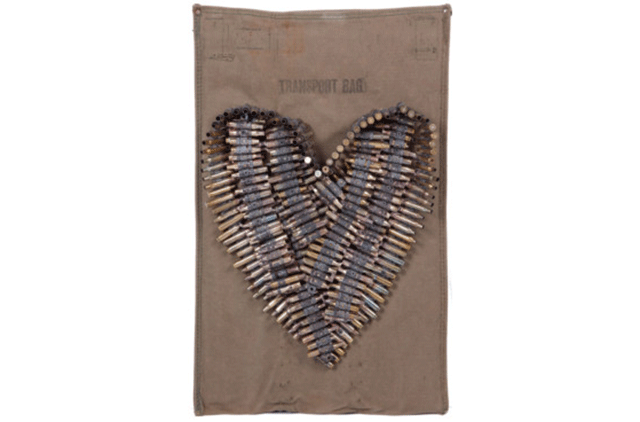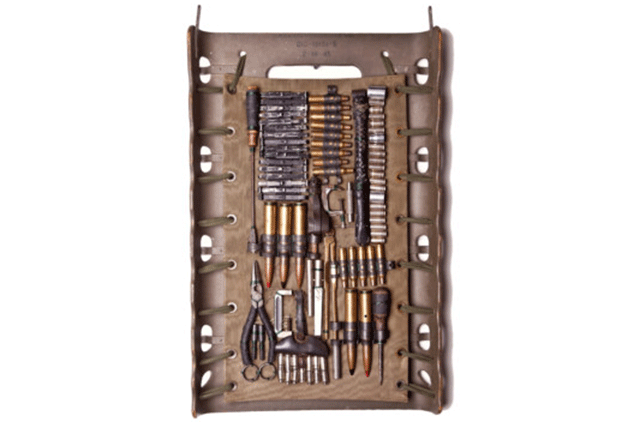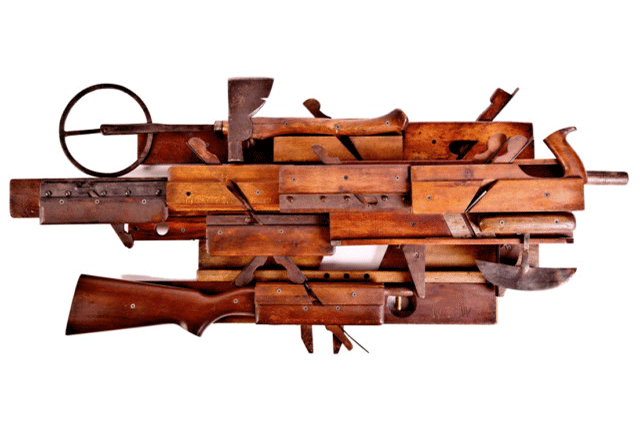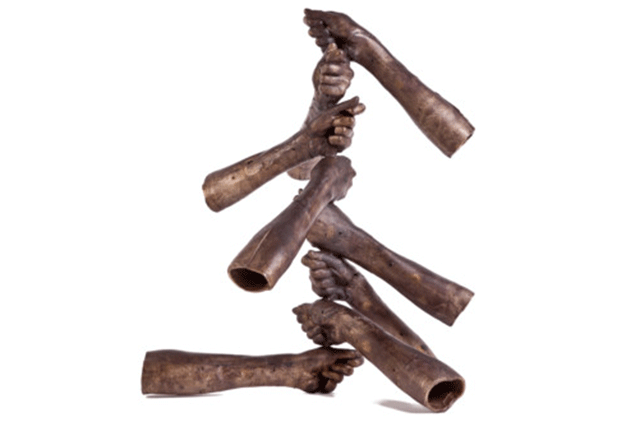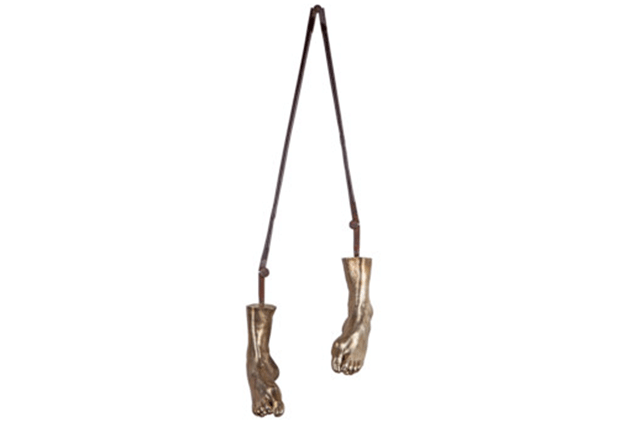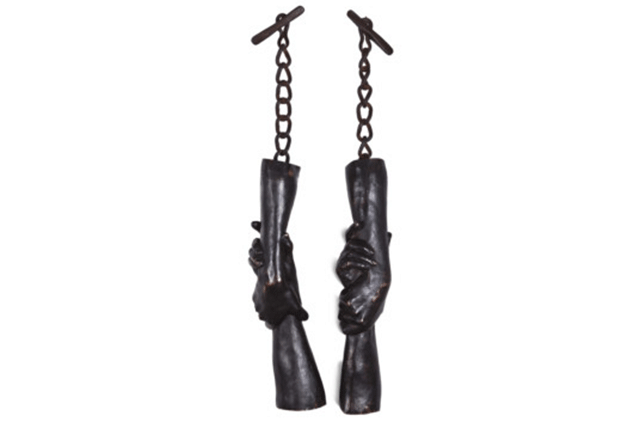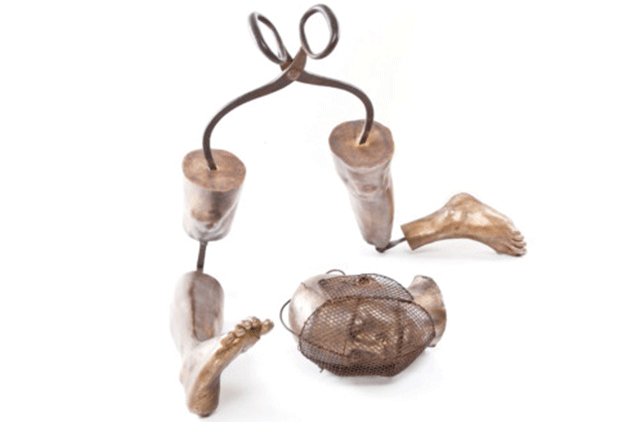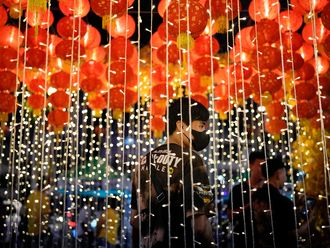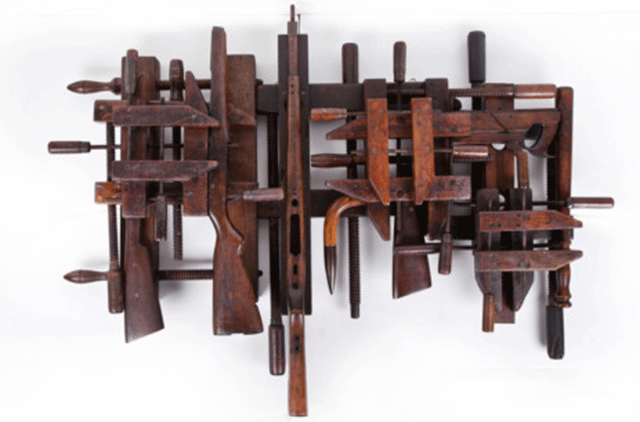
Artist Sara Rahbar’s family moved from Iran to the US when she was five years old. In her earlier work she has dealt with issues of identity and the traumatic memories of violence and displacement that still affect her.
Rahbar’s third solo show in Dubai, “Swarming”, also has autobiographical undertones; but it goes beyond personal concerns to address the general human condition in our times. The show speaks about the anxiety and loss of control felt by ordinary people as they toil ceaselessly to deal with the demands and constraints of contemporary life.
Rahbar has a huge collection of workers’ tools and war related objects bought from flea markets, used goods stores, Army and Navy stores and families of war veterans in Iran and the US, which she uses to create her unusual artwork.
In this show she has used farming equipment, police batons, old weapons, shoe forms, butcher’s hooks and carpentry tools to make a series of interesting installations.
'Confessions of a Sinner'
The series, titled “Confessions of a Sinner” pays tribute to the hard work and sacrifice of soldiers and other ordinary workers in our society. In another series, titled “206 Bones”, (referring to the number of bones in the human body) Rahbar has used casts of her hands, legs and head to create bronze sculptures that talk about our aspirations and apprehensions, while questioning our idea of success and progress. By combining memory, ideological symbols, and body parts, the artist highlights the fact that our minds and bodies have become like tools, worn out with the daily grind of our relentless pursuit of individual desires and collective progress.
“The word swarming makes you think of a group of bees or wasps about to attack. The army also uses the term ‘military swarming’ for an imminent attack. The thousands of protesters who came out on the streets in recent times also reminded me of a buzzing swarm ready to attack. So, the title of this show reflects the tension and extreme anxiety of seeing a swarm coming to attack you,” Rahbar says.
“The tools and the body parts in my artwork refer to people who work very hard in difficult jobs for poor compensation. They are trapped in a vicious cycle with no scope for improvement in their quality of life. Many of the tools in these artworks are used to hold things in place or exert pressure.
"Like the bullets, batons and other weapons in my pieces they evoke the idea of control and of trying to hold things together. And the recurring presence of wheels alludes to the endless vicious cycle that ordinary people get sucked into by social and political systems, including revolutions that are also controlled by hidden forces. The objects in my organic yet precise arrangements are all old, used, beat up, scratched and dirty because life is imperfect and messy,” she adds.
Personal
Rahbar’s bronze sculptures are more personal.
“I decided to use this medium for the first time because I felt the need to move away from found objects and make pieces that are more intimate. My work is about my feelings and my life, so it had to be my body. I tend to curl my toes when I am tense; and I have cast my legs with the feet in that particular pose to convey the general feeling of anxiety that pervades in our society today,” she says.
The titles of her sculptures offer insights into the thoughts and emotions behind every piece of work. A piece featuring two hands with one desperately gripping the other is poignantly called “Stay”.
“This piece is about holding onto something that is gone or slipping out of our control. It is based on my own relationships; but it is essentially about the memories that traumatise and paralyse us, tying us down to the past and preventing us from moving on. On another level, this piece alludes to the images from Syria and Palestine of people being pulled out from the rubble and orphaned children traumatised by their experiences of violence, war and death,” Rahbar says.
Similarly, “Do You Love Me”, features two hinged legs chained together and placed on the floor. “These disembodied legs can be moved in different ways, but the distance they can travel is controlled by the chains. The feeling of violence and anxiety is inherent in this piece. And the hinged legs also evoke the feeling that we have all become like machines, working incessantly in the futile pursuit of happiness and love. The work reflects my own pain of never feeling loved in my relationships; but it also questions the idea of the need to be loved or to belong,” the artist says.
In other works such as “Championship”, “Victor” and “I will shelter you” the artist questions the logic of war, the idea of winning a war and the general obsession with being number one regardless of the physical and mental cost.
“The competition to keep doing better and the fear of being left behind in the race has made us like machines who keep working to build things that sustain us but also destroy us in the end. We need to stop and think about the dreams, anxieties, memories, relationships and sociopolitical systems that affect our choices and actions,” Rahbar says.
“Swarming” will run at Carbon 12 gallery until January 8, 2015.
Jyoti Kalsi is an arts enthusiast based in Dubai.



